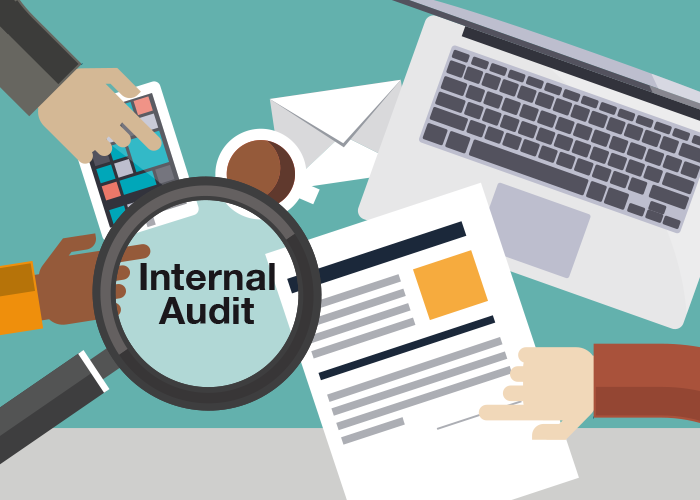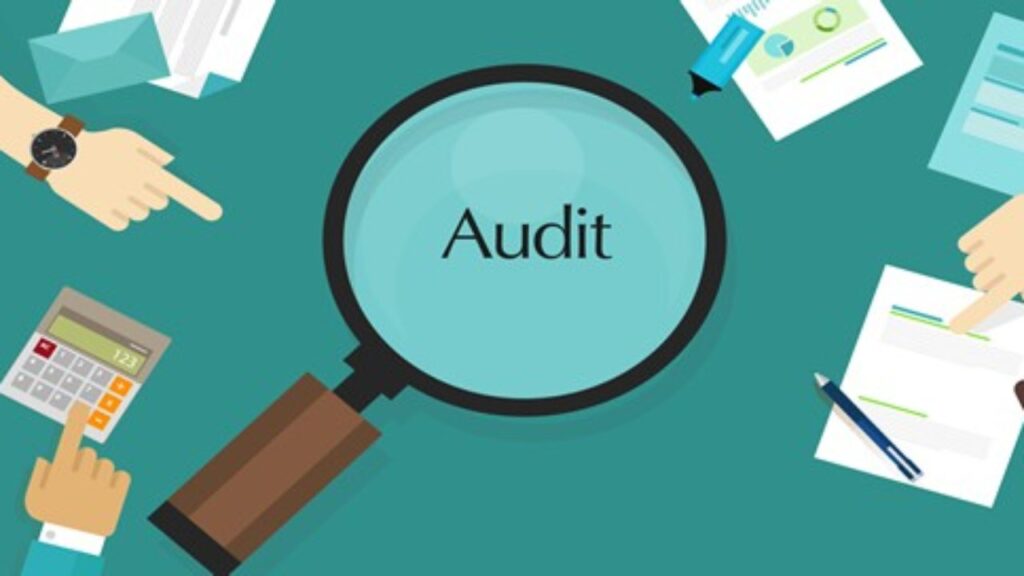Financial auditing is a comprehensive analysis of companies’ and organizations’ financial reports to ensure their accuracy and compliance with local and international accounting standards. Auditing requires a thorough analysis of all financial details, including revenues, expenses, assets, and liabilities. This process helps companies maintain transparency and credibility with stakeholders, such as investors and shareholders, and enhances confidence in the reported figures. Thanks to auditing, any irregularities or accounting errors can be identified before they significantly impact the company’s financial performance.
Introduction to Internal and External Auditing
Auditing is divided into two main types: internal and external. Each type has a vital role in governance and improving financial performance.
- Internal auditing: Performed by a specialized internal team within the company itself, it aims to improve internal processes and assess financial risks. Internal auditing provides ongoing recommendations to management to avoid potential problems and improve operational efficiency. Internal auditing relies on international auditing standards, such as the Global Standards for Internal Auditing, to ensure transparency and compliance.
- External auditing: Relies on an independent, external entity with experience in the field of auditing, and its primary objective is to provide an unbiased report on the company’s financial position. External auditing helps enhance transparency and trust between a company and external stakeholders, such as investors and shareholders.
The Importance of Financial Auditing in Governance
Good governance relies heavily on the accuracy of financial reporting and companies’ adherence to recognized accounting standards. Financial auditing plays a key role in this context, as it contributes to assessing a company’s compliance with laws and regulations. Auditing helps identify financial and administrative weaknesses and provide recommendations for correcting them, enabling companies to more efficiently utilize their resources and achieve their objectives.
Internal auditing, for example, is an important component of improving financial performance and operational efficiency. Internal auditors analyze a company’s daily operations and provide periodic reports to management, including recommendations for improving performance and reducing costs. These reports enable informed decision-making, which contributes to improved control over operational processes.
External Auditing and Ensuring Transparency
On the other hand, external auditing provides assurance to external parties that financial reports reflect a company’s true performance. External auditors independently review accounts to ensure that the financial statements reported are accurate and reliable. This type of audit increases investor confidence in the company and enhances its reputation in the market, especially in the case of large investments or business transactions.
Technology in Financial Auditing
Technological advancements in recent years have significantly impacted the way audits are conducted. Technology in auditing has become an essential tool in improving the accuracy and effectiveness of audits. Digital analytics, artificial intelligence, and big data analytics tools help auditors analyze massive amounts of data faster and more accurately.
The Impact of Inaccurate Accounting Documentation
One of the problems companies may face is the failure to accurately document financial records, which leads to significant legal and financial risks. For example, not keeping commercial books can result in huge financial penalties and damage the company’s reputation. For this reason, auditing plays a crucial role in ensuring that every financial transaction is properly recorded and documented in accordance with the law.
The Role of Internal Audit in Organizations

The Role of Internal Audit in Organizations
Internal auditing is an independent, objective activity aimed at improving organizational performance by providing a systematic assessment of the effectiveness of administrative and financial processes. Internal auditors work within an organization to identify potential weaknesses in internal processes and provide recommendations for improving operational and administrative efficiency. Unlike external auditing, which primarily focuses on financial reporting, internal auditing focuses on day-to-day operations and internal controls, helping management make informed decisions and reduce operational and financial risks.
The Importance of Internal Auditing in Improving Operational Efficiency
Internal auditing is a vital tool for improving the operational efficiency of organizations. By examining daily operations, internal auditors can identify deficiencies in business systems and propose solutions to address them. For example, internal auditing may help uncover conflicts of interest between departments or discover opportunities to reduce costs and improve productivity.
Furthermore, internal auditing contributes to the prevention of poor business bookkeeping, emphasizing the importance of maintaining accurate financial records as a means of avoiding legal and financial issues. Technology also helps enhance the effectiveness of internal auditing by improving data analytics tools, allowing auditors to identify errors and risks more quickly.
The Difference Between Internal Audit and Internal Control
Although internal audit and internal control overlap in some respects, there are important differences between them. Internal control is the system a company puts in place to ensure that all operations are conducted in accordance with established policies and procedures. In contrast, internal audit evaluates the effectiveness of these systems and ensures that they are operating properly.
For example, internal auditors can evaluate financial systems to ensure they adhere to required accounting standards. This helps reduce the risk of fraud or financial errors. The Saudi tax number 2024 can serve as an example of how tax policies impact financial operations, as companies must comply with tax requirements to ensure they are not subject to any legal penalties.
The Importance of Internal Audit in Governance
Internal audit plays a pivotal role in promoting good governance within organizations. By monitoring administrative and financial performance, internal auditors can contribute to achieving company objectives more effectively. Internal auditing is not limited to verifying the accuracy of figures; it also seeks to improve processes, reduce waste, and increase efficiency.
For more information on the importance of internal auditing in promoting transparency and efficiency, please visit the Institute of Internal Auditors website, which offers useful educational resources on internal auditing practices.
External Auditing: Definition and Importance

External Auditing: Definition and Importance
External auditing is the independent review of a company’s financial statements by independent auditors outside the organization. The objective of external auditing is to ensure that the financial statements present an accurate and fair picture of the company’s financial performance, helping to increase investor and stakeholder confidence. External auditors review the financial records, ensure that the organization adheres to recognized accounting standards, and verify the absence of fraud or errors.
The Importance of External Auditing in Promoting Transparency
External auditing is an important tool for promoting transparency in corporate financial transactions. By providing independent reports, investors and shareholders can see the true financial performance of the organization. This transparency contributes to building trust between investors and management, which can lead to attracting new investments. External auditing also helps companies identify potential financial risks and improve financial control procedures.
The Difference Between Internal and External Auditing
While internal auditing focuses on improving internal processes and performance efficiency, external auditing focuses on ensuring the accuracy and reliability of financial statements presented to the public. External auditing is important for organizations seeking to attract new investors or borrow funds, as lenders and investors require external audit reports to ensure the integrity of financial statements.
Using Technology in External Auditing
Technology also helps improve the effectiveness of external auditing. Auditors can use data analytics tools to quickly analyze large amounts of information, making it easier to identify potential issues in financial statements. For example, advanced analytics software can be used to detect patterns or anomalies in data, enhancing the efficiency of external audits.
Legal Implications of External Auditing
External auditing is also essential to meeting legal and regulatory requirements. In many countries, public companies are required to conduct annual external audits to ensure compliance with local and international laws. For example, in Saudi Arabia, there are specific requirements regarding the submission of externally audited financial reports. These requirements can be found through the General Authority of Zakat and Tax, making it easier for organizations to understand and comply with legal obligations.

The Importance of Collaboration Between Internal and External Auditors
Collaboration between internal and external auditors can improve the quality of both internal and external audits. Internal auditors possess in-depth knowledge of a company’s operations and weaknesses, while external auditors provide an independent and objective perspective. By sharing information and insights, both types of auditors can enhance the effectiveness of audits and achieve better results.
Common Challenges in Auditing
Despite the benefits of collaboration, organizations may face challenges when attempting to integrate internal and external audits. These challenges include a lack of communication between internal and external auditors, which can lead to conflicting objectives and duplication of efforts. Furthermore, auditors may face difficulty agreeing on appropriate audit methods and techniques, which can negatively impact the quality of the final results.
Strategies to Enhance Integration
To enhance integration between internal and external audits, organizations should develop clear strategies that include:
- Developing effective communication channels: Internal and external auditors should communicate regularly to ensure the exchange of necessary information and foster collaboration.
- Coordination of Efforts: Areas where collaboration between auditors can be improved should be identified, such as reviewing key processes or analyzing risks.
- Exchange of Knowledge and Experience: Through workshops and meetings, internal and external auditors can learn from each other, enhancing the quality of audits.
The Impact of Auditing on Decision-Making
The results of internal and external audits provide valuable information for management. The resulting audit reports help inform decisions about improving performance, reducing risk, and increasing efficiency. This information not only benefits senior management but also impacts all levels within the organization.
Conclusion
In general, both internal and external audits are essential components of a corporate governance system. Internal audit enhances the effectiveness of internal processes, while external audit provides assurance about the accuracy of financial statements. Through collaboration between internal and external auditors, organizations can improve financial performance and efficiently meet the needs of stakeholders.
We therefore recommend Business Pillars Accountants and Auditors, as the company plays a vital role in enhancing financial transparency and compliance for organizations in Saudi Arabia. By providing integrated auditing and accounting services, the company helps ensure the accuracy of financial data and helps inform decision-making. Business Pillars is one of the certified accounting firms in Saudi Arabia that strives to provide high-quality services. It relies on a team of professionals with experience in accounting and statutory auditing, enhancing organizations’ ability to comply with local and international standards.

